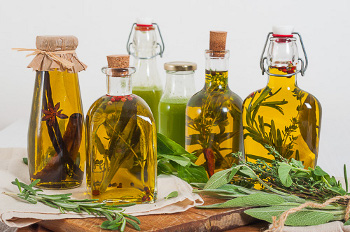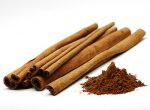
It’s the gift-giving season and we all look for great gift ideas for those we care about. So it’s important to make sure that the gifts we give them don’t make them sick. Infusing oil, honey, or vinegar with herbs is an inexpensive and fun way to pamper our loved-ones that enjoy cooking, but there are significant risks if it isn’t done properly.
Step 1: Sterilize Containers
Start by choosing glass containers that have no chips or cracks. Then thoroughly wash and then sterilize them by boiling them for at least 10 minutes. And don’t forget to sterilize the lids too. This will eliminate any residual pathogens on them.
Step 2: Choose Quality Ingredients
Use only fresh herbs, fruits and vegetables that have no visible blemishes or bruises. This makes it less likely that they will contain harmful bacteria. And then, be sure to wash them well before using them.
Step 3: Refrigerate or Freeze
Storing the finished product in the fridge or freezer makes it less likely that bacteria will grow in it.
Infusing Oil or Honey
Oil creates an environment where air is not present. This makes it easy for certain types of bacteria to grow, including the potentially deadly botulism toxin. Since produce items like garlic and herbs can harbor C. botulinum, it’s a good idea to destroy any bacteria on those items before adding it to oil. You can do this by soaking the products in a citric acid solution to reduce the pH and destroy bacteria that might be present.
Specifically, the citric acid solution needs to be strong enough to bring the pH level of the garlic, herbs, or other ingredients down to 4.2 or less within 24 hours. This paper outlines how you can do that. (This technique is also how manufacturers process infused oils that you can buy off the shelf.)
The oil or honey should also be heated to at least 180 degrees Fahrenheit before adding the other ingredients. Here are complete instructions for safely doing that. Only store these oils, refrigerated for up to 3 weeks.
Infusing Vinegar
Heat the vinegar to 190 degrees Fahrenheit before adding it to the other ingredients, and be sure to fill the container to within 0.25 inches of the top of the container. If you’d like more details, you can find them here. Once you’ve made them, infused vinegars can be safely kept in a cool, dark place for 2-3 months or refrigerated for 6-8 months.
Recipes
Here are some recipes for flavored oils and vinegars from BON APPÉTIT and Colorado State University Extension to get you started.
Resource Links
How to Infuse Oils, Vinegars, Liquor or Honey (Without Making People Barf)
Current Food Safety Issues of Home-prepared Vegetables and Herbs Stored in Oil
Acidification of Garlic and Herbs for Consumer Preparation of Infused Oils
Making Garlic- and Herb-Infused Oils
At Home
Colorado State University Extension: Flavored Vinegars and Oils
Even Lazy People Can Make This Fancy Edible Gift


















